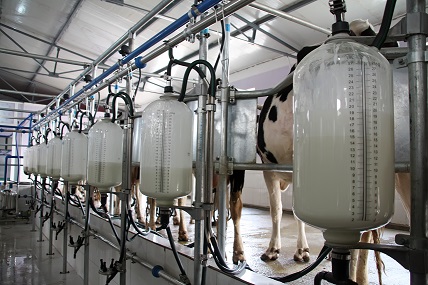Nigeria has begun importing high-yield dairy cattle from Denmark in a major step towards strengthening local milk production and reducing the country’s reliance on dairy imports, according to the Minister of Livestock Development.
Despite owning over 20 million cattle—one of the highest numbers in Africa—Nigeria produces just 700,000 tonnes of milk annually. This falls far short of the 1.6 million tonnes required to meet national demand, forcing the country to spend about \$1.5 billion every year on dairy imports. This heavy import burden has long been a concern for policymakers, especially as the country works to improve food security and build a sustainable agricultural economy.
The Minister revealed that the government’s goal is to double domestic milk production to 1.4 million tonnes within the next five years. Achieving this, he said, will involve integrating imported, high-yield dairy breeds into Nigeria’s production system, which is currently dominated by low-yield indigenous cattle raised by nomadic and semi-nomadic pastoralists.
He explained that the imported dairy cattle—such as those from Denmark—are specifically bred for milk production and have the capacity to produce significantly more milk than local breeds. One Nigerian farm has already received over 200 dairy heifers from Denmark and is adopting intensive breeding practices, with the aim of multiplying its herd and setting a model for other farms across the country.
“This is part of a broader livestock reform strategy that emphasizes improved genetics, better feed systems, and structured breeding,” the Minister stated. He added that the reforms also focus on the gradual transformation of Nigeria’s cattle management culture, moving from traditional methods to more commercially viable models.
In a related development, eight new species of pasture have been registered in Nigeria—the first time in nearly fifty years. This milestone is expected to support improved animal nutrition and higher milk yields. The government also launched a national strategy for animal genetic resources, supported by the Food and Agriculture Organisation (FAO), to help manage and improve local livestock breeds.
The Minister said the country’s existing livestock population, which includes 20.9 million cattle, 60 million sheep, and 1.4 million goats, provides a strong base for rapid growth, particularly if supported with the right investments in genetics, pasture development, veterinary care, and breeding infrastructure.
He stressed that the initiative is aligned with the federal government’s broader food security agenda, which includes reducing dependence on imported agricultural products, increasing local productivity, and ensuring that Nigerian farmers and agribusinesses can benefit from a growing domestic market.
While the importation of cattle may raise concerns about cost and sustainability, the Minister noted that the long-term goal is self-reliance. “We are not building dependency on imported animals. We are investing in local capacity, strengthening our systems, and using these breeds to spark the kind of productivity that our economy urgently needs,” he said.
As Nigeria moves to reposition its livestock industry, officials say success will depend not only on the import of high-yield breeds but also on farmer education, improved veterinary services, and supportive policy reforms to ensure long-term impact.










